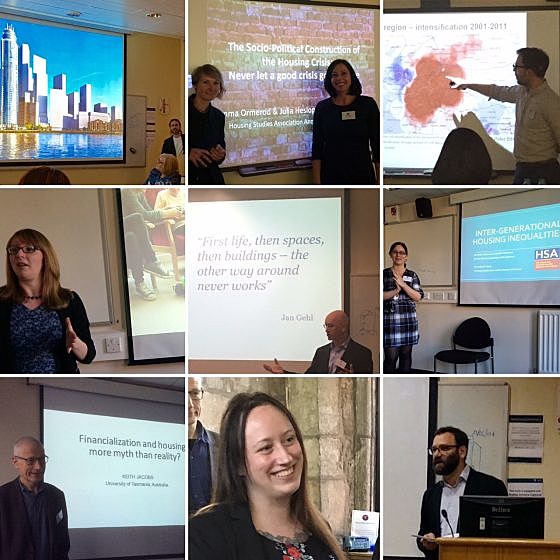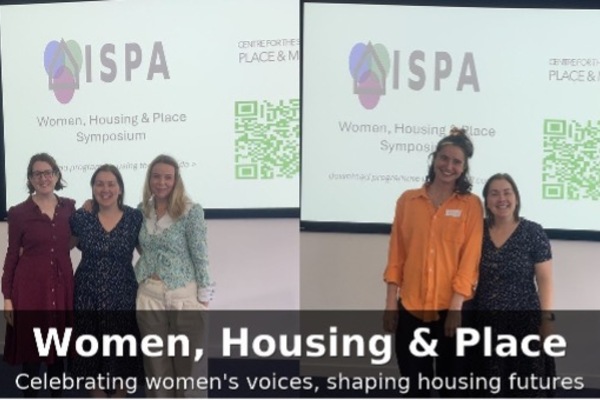
Last week’s Housing Studies Association conference focused on the financialisation of the housing system and connections with societal inequality and precariousness. That we are in the midst of a housing crisis was an implicit starting point (though not one that escaped critical scrutiny within the workshops). Certainly, all is not well in relation to housing, both within and beyond the UK, as the topics and geographical coverage of many of the papers attested.
The impacts of the financialisation of housing were starkly illustrated in Olly Wainwright’s opening plenary, a powerful account of the processes undermining the provision of affordable homes in London, as well as in Bob Colenutt’s account of the role of viability assessment in limiting the affordable housing contributions of new developments. Given my own research interests, I spent much of my time in the homelessness-focused workshops, where a sense of crisis inevitably loomed when confronted with the sharp increases in all forms of homelessness seen in England since 2010.
This sense of crisis is not restricted to the field of housing. The uncertainty associated with Brexit (the focus of Ken Gibb and Duncan Maclennan’s paper) risks entirely crowding out all social and economic reform for the foreseeable future (see Toby Helm in this weekend’s Observer). Nor is this sense of crisis limited to the UK, as the multiple shocking news headlines on the closing day of the conference reminded us.
A colleague’s reflection to me one evening that the housing sector (academics and professionals alike) are negotiating the ‘phases of grief’ struck a chord. Denial and disbelief, swiftly followed by anger, seems like a fair characterisation of responses to public spending and welfare cuts, the impact of these policy decisions on lower income household’s capacity to afford housing and other basic goods, and moves to end security of tenure in social housing that previous years have seen. These reactions soon gave way to (sometimes successful) bargaining, for instance in the progress of the 2016 Housing and Planning Bill through scrutiny in the House of Lords and in the on-going efforts of the UK’s devolved administrations to mitigate the impacts of Westminster-led cuts. Depression too has no doubt had its place, as I was reminded when a colleague whispered during one of the conference plenaries that the overall thrust of the event seemed to be a slightly more colourfully articulated version of ‘what a mess!’
But reflecting on the conference as it drew to a close, it was hard to maintain such a down-beat analysis. The mood left in the aftermath was far from one of depression, or indeed of acceptance, the claimed final stage of grief, and in any case, a wholly un-academic disposition.
First, housing is not dead, so the grief-metaphor only goes so far. I was reminded of this in conversation with David Madden (LSE), who argued that financialisation is a political problem in our final plenary session. It turns out that David and Peter Marcuse, authors of In Defence of Housing, had to resist the suggestion of an alternative title for the book – The End of Housing – attention grabbing perhaps, but inaccurate in their view. Ian Cole and David Robinson also made the case for a more optimistic (if cautiously so) view of the present context and future prospects in their ambitious paper The Unexpected Resilience of Social Housing in England: Challenging Narratives of Decline. Furthermore, as Mark Stephens reminded delegates in his paper Social Rented Housing in the (Dis)United Kingdom, moves away from security of tenure and subsidised rental housing characterise only English housing policy, with very different policy developments seen elsewhere in the UK, where a range of progressive measures have been instituted in recent years. The recent Housing White Paper hints of some moderation of the previous direction of travel even in England.
Second, though analyses of the housing crisis were undoubtedly a running theme throughout the conference, so too were accounts of the differentiated nature and scale of the impacts of ‘financialisation’. Discussion following the often London-focused plenaries reminded us that these processes manifest differently in the North of England, Scotland, Wales and Northern Ireland. Moreover, the conference was full of examples of creative, values-driven and evidence-informed regeneration, housing development and activism, seeking to offer alternatives to insecurity, inequality and instability. Shelagh Grant (the Housing Forum), Dinah Roake (Trustee, Brixton Green), Paul Quinn (Clarion Housing), Blase Lambert (Confederation of Co-operative Housing) and David Madden (LSE) all offered examples of such models in their contributions. Though many of the homelessness-focused sessions contained warnings about the negative impacts of welfare and budget cuts, innovation in local responses (Adam Stephenson’s paper, for instance) and positive developments in national legal frameworks (including the recently passed Homelessness Reduction Bill) were also part of the story.

Top (left to right): Olly Wainwright (Guardian), Emma Ormerod and Julia Heslop (University of Durham), Richard Dunning (University of Liverpool). Middle (left to right): Vikki McCall (University of Stirling), Paul Quinn (Clarion Housing Group), Jenny Hoolachan (University of Cardiff). Bottom (left to right): Keith Jacobs (University of Tasmania), Regina Serpa (Heriot-Watt University), David Madden (LSE).
Third, it is hard to be downcast about the future of housing given the vibrant group of academics and practitioners who attended this year’s conference. The quality and energy of the early career housing researchers was once again striking, as was the competitive set of entries to this year’s Valerie Karn early career researcher prize, won by Regina Serpa (I-SPHERE, Heriot-Watt University) for her paper on migrant homelessness. It was also great to see contributors to the early career workshops in previous years ‘graduating’ into the mainstream sessions with brilliant papers. This cohort of talented new researchers will surely have left this year’s conference better equipped for the task ahead, thanks to Ian Cole’s superb pre-dinner speech in which he offered inspiration and practical advice to those at the ‘start of the road’ (though I think those further along might also put it to good use!).[i]
Finally, the conference was punctuated with long awaited news about the Economic and Social Research Council and Joseph Rowntree Foundation’s investment in a Collaborative Centre for Housing Evidence (CaCHE), to be based at the University of Glasgow, which will seek to provide the evidence and analysis required to “influence and transform housing policy and practice through better problem diagnosis, policy evaluation and appraisal of new opportunities, in order to generate improved housing outcomes for all”.
Reflecting on this year’s conference it is clear that for housing academics and practitioners there will not be a final stage of acceptance. Rather, there will be an on-going commitment to robust critical analysis and constructive reflection. We know some of the ways that policy and practice should and can change for the better in relation to housing, and where we don’t know, we have a good chance of getting closer to the answers given the skills, resources and work underway in the housing sector and housing studies discipline.
Thank you to Sarah Payne (University of Sheffield) and Martin Field (DeMontford University) for organising a brilliant conference, and to all of the delegates and speakers who made it such a stimulating few days. Thanks also to David Manley for his excellent work as Chair of the HSA for the last two years. We look forward to seeing familiar and new faces at next year’s conference[ii], if not before. In the meantime, stay in touch by becoming an HSA Member, following our twitter account (@HSA_UK) and contacting any of our committee members. And why not help continue the conversation by applying for HSA event funding?
Beth Watts, Chair of the Housing Studies Association, April 2017
[i] Always take the lead (especially your laptop lead); don’t eternalise the present day; read outside the zone (and feel free to quote Gill Scott Heron in academic papers); read Writing for Social Scientists (Becker), On Intellectual Craftsmanship (C Wright Mills) and The Catechism of Cliché (Flann O’Brien in The Best of Myles); and (evidenced with a wonderful photograph of a young Ian Cole) beware the ravages of doing contract research over a prolonged period of time.
[ii] Next year’s conference will be on the theme Professionalism, Policy and Practice: Exploring the relationship between Theory and Practice in Housing Studies and organised by HSA Committee members Tony Manzi (University of Westminster) and Joe Crawford (University of St Andrews).






